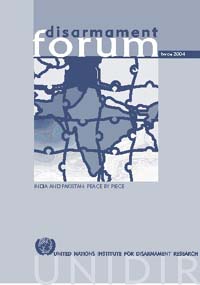Events since the beginning of this year offer cautious hope for improvement in relations between the nuclear-armed South Asian neighbours of India and Pakistan. Beginning with a meeting of the Indian Prime Minister and Pakistan’s President on the sidelines of the SAARC Summit in January and followed a few weeks later by their Foreign Secretaries issuing a Joint Statement on the resumption of a formal composite dialogue, India and Pakistan are moving towards normalization of relations through a series of both high-level and technical talks on issues including Jammu and Kashmir; peace and security, including confidence-building measures; terrorism and drug trafficking; and economic and commercial cooperation. The two nations just completed the first full cricket tour by India to Pakistan in fifteen years—a series marked by bonhomie and sportsmanship and heralded as a successful example of building people-to-people ties between the two countries.
However, much can upset this delicate process. Optimism concerning the steps towards resolving long-standing differences is tempered by the possibility that either external or internal events could disrupt the process, as evident in the postponement of talks on starting a bus service between the two parts of Kashmir. In addition, there is constant fear that violent action by armed transnational non-state actors could easily derail the drive towards normalization. Clearly, one of the biggest changes for both India and Pakistan is to insulate the process of normalization and people-to-people contact from the perennial upheavals that have marked their troubled bilateral relationship. This issue of Disarmament Forum takes stock of recent developments and looks ahead to the key issues facing the region including the arms race, the performance and prospects of confidence-building measures as well as the role of the United States, whose current level of simultaneous involvement with both Pakistan and India is without precedent.
Citation: Kerstin Vignard (ed.) (2004). "Disarmament Forum: India and Pakistan: Peace by Piece", UNIDIR, Geneva.
Disponible aussi en français.
Contents
- Editor’s note, Kerstin Vignard
- Special Comment, Maleeha Lodhi
- A languid but lethal arms race, Waheguru Pal Singh Sidhu
- Seizing the 'ripe' moment: building confidence and security in South Asia, David Logan and Stuart Croft.
- The United States’ role and influence on the India-Pakistan conflict, Rahul Roy-Chaudhury
- Strategic stability in South Asia: the need for restraint in targeting technologies, Gaurav Rajen
- Living with a nuclearized South Asia: rethinking disarmament and security, Iftekhar Zaman
- Assistance for curbing small arms and light weapons in Cambodia: the result after four years of field work, Robin-edward Poulton, Seng Son and Neil Wilford
- UNIDIR Focus
